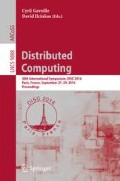Abstract
In this paper, we define k-abortable objects, the first kind of abortable objects [2, 7] that guarantee some degree of progress even under high contention. The definition is simple and natural: intuitively, an operation on a k-abortable object can abort only if k operations from distinct processes succeed during the execution of the aborted operation. We first show that k-abortable objects can easily implement k -lock-free objects, i.e., objects where at least k processes make progress [5], but in contrast to k-lock-free objects, k-abortable objects always return control. We then give an efficient universal construction for wait-free k-abortable objects shared by n processes that takes only O(k) steps per operation. We also give a \(\varOmega (\log k)\)-steps lower bound for universal constructions of k-abortable objects shared by \(n \ge k\) processes. Since every wait-free k-abortable object can implement its k-lock-free counterpart, our universal construction also provides a universal construction for k-lock-free objects.
N. Ben-David—Part of this work was done while the author was at the University of Toronto.
Access this chapter
Tax calculation will be finalised at checkout
Purchases are for personal use only
Notes
- 1.
This is akin to entering a bakery and getting stuck inside forever, because other customers keep cutting in line.
- 2.
This is akin to entering a bakery and being notified that it is currently too busy; the customer is now free to do other errands and come back later, when the bakery may be less busy, or to go to another bakery.
- 3.
So \(\textit{op}\) cannot abort just because it is concurrent with k operations of a fast process.
- 4.
So they cannot cause operations that start after \(\textit{op}\) to abort.
- 5.
In general, k-abortable objects require strong primitives because they can implement their lock-free counterparts.
- 6.
This was originally called the deterministic abortable counterpart of a type T in [7].
- 7.
This is not obvious, but it is possible to construct such runs of the adaptive algorithm in [1].
References
Afek, Y., Dauber, D., Touitou, D.: Wait-free made fast. In: Proceedings of the Twenty-Seventh Annual ACM Symposium on Theory of Computing, pp. 538–547. ACM (1995)
Aguilera, M.K., Frolund, S., Hadzilacos, V., Horn, S.L., Toueg, S.: Abortable and query-abortable objects and their efficient implementation. In: Proceedings of the Twenty-Sixth Annual ACM Symposium on Principles of Distributed Computing, pp. 23–32. ACM (2007)
Attiya, H., Guerraoui, R., Kouznetsov, P.: Computing with reads and writes in the absence of step contention. In: Fraigniaud, P. (ed.) DISC 2005. LNCS, vol. 3724, pp. 122–136. Springer, Heidelberg (2005)
Brown, T., Ellen, F., Ruppert, E.: A general technique for non-blocking trees. In: Proceedings of the 19th ACM SIGPLAN Symposium on Principles and Practice of Parallel Programming, pp. 329–342. ACM (2014)
Bushkov, V., Guerraoui, R.: Safety-liveness exclusion in distributed computing. In: Proceedings of the Twenty Fourth Annual ACM Symposium on Principles of Distributed Computing. ACM (2015)
Fatourou, P., Kallimanis, N.D.: Highly-efficient wait-free synchronization. Theor. Comput. Syst. 55(3), 475–520 (2014)
Hadzilacos, V., Toueg, S.: On deterministic abortable objects. In: Proceedings of the 2013 ACM Symposium on Principles of Distributed Computing, pp. 4–12. ACM (2013)
Herlihy, M.: Wait-free synchronization. ACM Trans. Program. Lang. Syst. (TOPLAS) 13(1), 124–149 (1991)
Herlihy, M., Luchangco, V., Moir, M.: Obstruction-free synchronization: Double-ended queues as an example. In: 23rd International Conference on Distributed Computing Systems, Proceedings, pp. 522–529. IEEE (2003)
Herlihy, M.P., Wing, J.M.: Linearizability: a correctness condition for concurrent objects. ACM Trans. Program. Lang. Syst. (TOPLAS) 12(13), 463–492 (1990)
Jayanti, P.: A time complexity lower bound for randomized implementations of some shared objects. In: Proceedings of the Seventeenth Annual ACM Symposium on Principles of Distributed Computing, pp. 201–210. ACM (1998)
Kogan, A., Petrank, E.: Wait-free queues with multiple enqueuers and dequeuers. ACM SIGPLAN Not. 46, 223–234 (2011). ACM
Michael, M.M., Scott, M.L.: Simple, fast, and practical non-blocking and blocking concurrent queue algorithms. In: Proceedings of the Fifteenth Annual ACM Symposium on Principles of Distributed Computing, pp. 267–275. ACM (1996)
Taubenfeld, G.: Contention-sensitive data structures and algorithms. In: Keidar, I. (ed.) DISC 2009. LNCS, vol. 5805, pp. 157–171. Springer, Heidelberg (2009)
Author information
Authors and Affiliations
Corresponding author
Editor information
Editors and Affiliations
Rights and permissions
Copyright information
© 2016 Springer-Verlag Berlin Heidelberg
About this paper
Cite this paper
Ben-David, N., Chan, D.Y.C., Hadzilacos, V., Toueg, S. (2016). k-Abortable Objects: Progress Under High Contention. In: Gavoille, C., Ilcinkas, D. (eds) Distributed Computing. DISC 2016. Lecture Notes in Computer Science(), vol 9888. Springer, Berlin, Heidelberg. https://doi.org/10.1007/978-3-662-53426-7_22
Download citation
DOI: https://doi.org/10.1007/978-3-662-53426-7_22
Published:
Publisher Name: Springer, Berlin, Heidelberg
Print ISBN: 978-3-662-53425-0
Online ISBN: 978-3-662-53426-7
eBook Packages: Computer ScienceComputer Science (R0)

